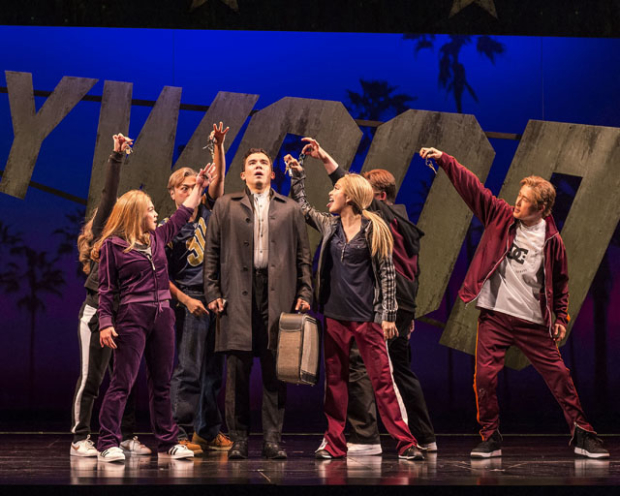Soft Power Offers an East-Meets-West Story Wrapped in a Hallucinatory Dream
A highly pedigreed creative duo tackles current events in this world premiere at the Ahmanson Theatre.

(© Craig Schwartz)
What was the last musical to feature Hillary Clinton twerking at a McDonald's or White House cabinet members bloodthirstily carrying tommy guns? Soft Power, the new political-satire musical by two Tony winners, composer Jeanine Tesori and writer David Henry Hwang, ambushes the 2016 US election through the eyes of a foreigner.
A fictionalized Chinese-American writer named David Henry Hwang (Francis Jue) meets with a Chinese producer, Xue Xing (Conrad Ricamora), to collaborate on a new project. The producer and the writer clash because of fundamental differences between the two cultures. A chance meeting with presidential candidate Hillary Clinton and a traumatic event cause David to have a fever dream where he imagines a flashy musical, created by the Chinese, about Xing and his Candide-like adventures in America. Through the songs, Xing evaluates love and democracy, and how to balance both, while falling in love with Hillary Clinton (Alyse Alan Louis).
Soft Power is all about perception: how the Chinese perceive the United States, how an American author of Chinese descent remarks on those Chinese acuities, how the American musical can be a critique of the American dream when observed by the Chinese. Lifting autobiographical scenarios and filtering them through multiple lenses, Hwang has built a complex bridge between two divergent cultures.
There are almost too many layers that are frayed, however. While the opening scenes between David and Xue Xing click (thanks to insightful writing that draws parallels between these superpowers), the musical portion, reminiscent of the "Loveland" sequence from Follies, lacks a comprehensible point of view. This musical sequence fills most of the play's running time and purports to depict a broad view of Americana as seen by the Chinese, but it's really David's subconscious and tangled view of how the Chinese imagine American life. As presented in the musical, the precepts are too heavy-handed to provoke anyone to change their thinking.
Tesori's score features several clever songs that are a pastiche of Broadway's heydays and its future, evoking everything from Richard Rodgers love ballads to Hamilton-like hip-hop. Hwang's lyrics are both conversational and lyrical. "Dutiful," a duet between Xue Xing and his daughter, lays out the responsibility and hierarchy of the Chinese family unit. "It Just Takes Time" teaches the four tones of Mandarin pronunciation. "Election Night" is a hilarious Schoolhouse Rock spoof touching on how the Chinese interpret the free-for-all of the American voting system.
Ricamora carries the entire musical section and holds his own against Jue's pithy comments in the opening sequence. He has a lovely singing voice and a commanding presence that captures all the innocence and determination of a newcomer in a strange land. Louis seems uncomfortable and disconnected in the opening scenes as Xue Xing's American mistress. However, she is dynamic, hilarious, and spirited when playing Hillary Clinton through the musical, really letting loose with a rousing gospel plea for democracy. Jue plays David rather self-effacingly. In the first scene, before the play reveals that the writer is an interpretation of the play's author, it is unclear if the character is meant to be a clown or someone to be taken seriously.
Director Leigh Silverman has grand aspirations but ultimately never finds a unifying visual theme. Sam Pinkleton's choreography brings recycled and generic steps into the musical numbers, occasionally adding moments of well-known dance motifs such as "the floss" from the Backpack Kid or the "Shall We Dance" polka from The King and I to engage the audience for laughs. David Zinn's sets for the musical portion are appropriately bombastic, mocking the extravagance of icons like the McDonald's golden arches, the Hollywood sign, and the Ziegfeld Girl. Anita Yavich's costumes toy with the plaid world of the American west and jogging suits made fashionable by the hip-hop community.
In the show, the song "Democracy" is a battle cry to the American electoral system, which must continue despite its faults. Soft Power, despite structural issues, echoes this rebel yell of democracy and, like the US voting system, proves to be inherently powerful and worthy of investment.









